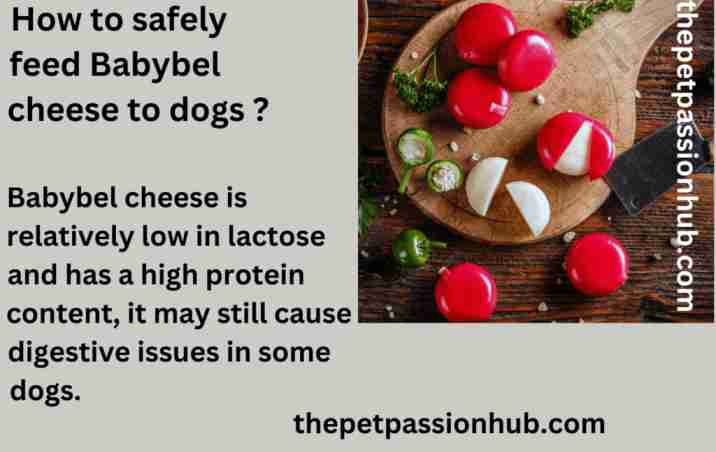Introduction
Vibrant, playful and downright adorable, dogs have a way of making our hearts melt with their puppy eyes and wagging tails. But when it comes to sharing food, can our furry companions indulge in the same cheesy treats we enjoy?
Today, we delve into the intriguing question: can dogs eat Babybel cheese? Prepare yourself for an exploration of taste buds and dietary restrictions. That will leave you with a newfound appreciation for both canine companionship and delicious dairy delights.
1. Can dogs eat Babybel cheese?
Despite its creamy and delicious taste, Babybel cheese may not be the best choice for your furry friend.
While dogs can consume small portions of certain types of cheese as an occasional treat. It’s important to consider their individual dietary needs. One factor to keep in mind is lactose intolerance in canines. Just like some humans, dogs can have difficulty digesting lactose, the sugar found in milk products.
When it comes to cheese, different varieties have varying levels of lactose. Although Babybel cheese considered a low-lactose option due to its aging process. It still contains lactose that might cause digestive upset in sensitive dogs. If your dog doesn’t show any signs of lactose intolerance.
And you decide to feed them babybel cheese as an occasional treat, always remember moderation is key. Overfeeding this snack can lead to weight gain and potential health issues such as pancreatitis or an unbalanced diet.
In conclusion, while indulging our canine companions with tasty treats is tempting. It’s crucial to prioritize their well-being by considering their specific dietary requirements.
Dogs with lactose intolerance or sensitive stomachs may not react well to Babybel cheese due to its lactose content. Opting for dog-friendly snacks that are specifically formulate for their needs. It will ensure they receive a balanced diet without any unwanted digestive issues or discomfort.
2. Benefits of Babybel cheese for dogs
When it comes to finding safe human foods that are also safe for dogs. It can be tricky to navigate through all the options.
However, when it comes to dairy products, Babybel cheese is actually a great choice for our furry friends. Not only is it delicious and fun to eat with its iconic red wax coating. But Babybel cheese also offers several benefits for dogs.
One of the key advantages of feeding your dog Babybel cheese is that it provides a good source of protein. Dogs need protein in their diets to maintain healthy muscles and tissues. And Babybel cheese contains about 5 grams of protein per serving.
Additionally, this tasty snack is low in lactose compare to other dairy products. This makes it easier for dogs with lactose sensitivities or allergies to digest without experiencing any uncomfortable side effects.
Furthermore, aside from its protein content, Babybel cheese also contains important nutrients such as calcium and vitamin B12. Calcium plays a vital role in maintaining strong bones.
And teeth in dogs while vitamin B12 helps support proper nervous system function. Adding small amounts of Babybel cheese as an occasional treat can contribute positively towards your dog’s overall diet.
In conclusion, not all human foods are safe for dogs but some can indeed offer health benefits. When consumed moderately by our four-legged companions.
Babybel cheese stands out as a nutritious option due to its protein content, relatively low lactose levels compared to other dairy products. And essential nutrients such as calcium and vitamin B12.
Please stay with us if you want to learn more about Buying Puppy With An Umbilical Hernia
3. Potential risks of feeding Babybel cheese to dogs
While many pet parents enjoy sharing treats with their furry friends. It’s important to be mindful of the potential risks involved. One such treat that often raises questions is Babybel cheese.
While humans love this creamy and delicious snack, it may not be the best choice for our canine companions. The main concern lies in the fact that dogs have a different digestive system than us, and dairy products can wreak havoc on their stomachs.
Dairy products contain lactose, which is a type of sugar found in milk. Dogs do not produce enough lactase, the enzyme responsible for breaking down lactose, which can lead to digestive issues like bloating, gas, diarrhea, and even vomiting.
Feeding Babybel cheese or any other dairy product to your dog may put them at risk of experiencing these uncomfortable symptoms.
Moreover, Babybel cheese is also high in fat and sodium content. While moderate amounts of fat are necessary for a dog’s diet, excessive consumption can lead to obesity and related health problems such as heart disease and joint issues.
Additionally, high levels of sodium can result in dehydration and increased blood pressure in dogs.
In conclusion, while sharing occasional healthy treats with your furry friend can be enjoyable for both parties involved, it’s crucial to prioritize their well-being over our desire to spoil them with human snacks like Babybel cheese.
Opting for dog-friendly alternatives that are specifically formulated with their dietary needs in mind will ensure that you’re providing them with safe and nutritious options they’ll truly enjoy without risking.
4. How to safely feed Babybel cheese to dogs?
When it comes to feeding Babybel cheese to dogs, safety should always be the top priority. While Babybel cheese can be a delicious treat for humans, it’s important to remember that dogs have different nutritional needs.
Although Babybel cheese is relatively low in lactose and has a high protein content, it may still cause digestive issues in some dogs. It’s best to consult with your vet before introducing any new food into your dog’s diet.

If you’re looking for alternative snacks for your furry friend, there are plenty of other options that can be both safe and nutritious.
For example, carrots are a great choice as they are low in calories and high in fiber, promoting good digestion. Additionally, apples slices without seeds or cores make for a tasty snack – just remember to remove the seeds as they can be toxic to dogs.
Ultimately, while Babybel cheese may not pose an immediate danger if given in moderation, considering the potential risks and exploring healthier alternatives will ensure that our four-legged friends receive the proper nutrition they need without compromising their wellbeing.
5. Alternative snacks for dogs
When it comes to alternative snacks for dogs, the options are endless! While cheese can be a tasty treat for your furry friend, it’s important to consider their overall canine diet.
If you’re looking for healthier alternatives that still satisfy their cravings, try incorporating fruits and vegetables into their snack repertoire. Not only are these options packed with essential nutrients, but they also provide a refreshing change of taste.
One great option is frozen banana slices. Simply peel and slice a ripe banana into small pieces, place them in the freezer until solid, and voila! Your pup will have a delicious and healthy snack to enjoy on hot summer days. Another fantastic choice is baby carrots.
These crunchy treats not only help keep your dog’s teeth clean and healthy but also provide them with additional vitamins and minerals.
While cheese can be enjoyed in moderation by some dogs, it’s always important to consult with your veterinarian before introducing any new food items into their diet.
By exploring alternative snacks such as frozen bananas or baby carrots, you can vary their snacking choices while keeping their health in mind. Remember to monitor portion sizes and adjust accordingly based on your dog’s age, size, and individual dietary needs – happy snacking!
Conclusion: Make informed choices about feeding your dog
When it comes to feeding our furry friends, making informed choices is crucial. Many dog owners may wonder if their dogs can eat Babybel cheese, it’s important to consider a few factors before tossing them a snack.
While Babybel cheese is generally safe for dogs to consume in small amounts due to its low lactose content and minimal processing, caution should still be exercised.
While Babybel cheese might seem like a dog-friendly option due to its small size and convenient individual packaging, certain precautions should be taken when feeding dairy products to pets.
Dairy products are not an essential part of a dog’s diet and can often lead to digestive issues such as diarrhea or stomach upset. Furthermore, some dogs may be lactose intolerant and unable to digest dairy properly.
Instead of relying on processed cheeses like Babybel, opting for natural and unprocessed fresh cheeses can provide your pooch with more nutritional benefits.
Cottage cheese or plain yogurt containing probiotics can offer some health benefits for your dog’s digestive system while avoiding unnecessary additives and artificial ingredients.
Ultimately, the key is balance and moderation in choosing what foods we give our beloved pets. Sticking mainly with their recommended diets supplemented by occasional treats that are safe for them will help ensure they receive proper nutrition without compromising their health or wellbeing.
Stay with us and Enhance your learning by knowing more about Can Dogs Eat Babybel Cheese? [Risks and Benefits]
FAQs
1- Can dogs eat Babybel cheese?
No, it is not recommended to feed dogs Babybel cheese as it can be difficult for them to digest and may cause stomach upset.
2- Is Babybel cheese safe for dogs?
While small amounts of plain cheese can be given as an occasional treat, Babybel cheese is high in fat and may lead to weight gain or pancreatitis in dogs.
3- What should I do if my dog ate Babybel cheese?
If your dog consumed a small amount of Babybel cheese, monitor them for any signs of digestive issues. However, if they ate a large portion or show symptoms like vomiting or diarrhea, contact your veterinarian.
4- Are there any health benefits to feeding my dog Babybel cheese?
There are no specific health benefits associated with feeding dogs Babybel cheese. It is best to stick to a balanced diet formulated for their nutritional needs.
5- Can lactose intolerant dogs have Babybel cheese?
Dogs that are lactose intolerant may experience digestive problems if fed dairy products like Babybel cheese, as it contains lactose. Avoid giving it to them.
6- How much Babybel cheese can I give my dog as a treat?
If you insist on giving your dog some plain cheese occasionally, limit the serving size to a small cube or sliver of Babybel and ensure it doesn’t become a regular habit.
7- Are there any alternatives to Babybel cheese that are safe for dogs?
Yes! Some safe options include low-fat cottage cheese or plain unsalted cooked chicken breast, which can serve as healthier and safer treats for your furry friend.
8- Why should I avoid feeding my dog processed cheeses like Babybel?
Processed cheeses often contain additives, preservatives, and excessive salt levels that are not suitable for canine consumption and could potentially harm their health.
